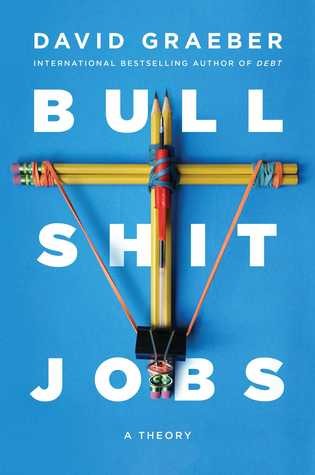fountainhead quoted Bullshit Jobs by David Graeber
In the immediate wake of the Civil War all this began to change with the first stirrings of largescale bureaucratic, corporate capitalism. The "Robber Barons," as the new tycoons came to be called, were at first met (as the name given them implies) with extraordinary hostility. But by the 1890s they embarked on an intellectual counteroffensive, proposing what Doukas and Durrenberger call, after an essay by Andrew Carnegie, a "Gospel of Wealth": The fledgling corporate giants, their bankers, and their political allies objected to producerist moral claims and, starting in the 1890s, reached out with a new ideology that claimed, to the contrary, that capital, not labor, creates wealth and prosperity. Powerful coalitions of corporate interests made concerted efforts to transform the message of schools, universities, churches, and civic groups, claiming that "business had solved the fundamental ethical and political problems of industrial society." Steel magnate Andrew Carnegie was a leader of this cultural campaign. To the masses, Carnegie argued for what we'd now call consumerism: the productivity of "concentrated" capital, under the wise stewardship of the fit, would so lower the price of commodities that the workers of tomorrow would live as well as the kings of the past. To the elite, he argued that coddling the poor with high wages was not good for "the race." The promulgation of consumerism also coincided with the beginnings of the managerial revolution, which was, especially at first, largely an attack on popular knowledge. Where once hoopers and wainwrights and seamstresses saw themselves as heirs to a proud tradition, each with its secret knowledge, the new bureaucratically organized corporations and their "scientific management" sought as far as possible to literally turn workers into extensions of the machinery, their every move predetermined by someone else. The real question to be asked here, it seems to me, is: Why was this campaign so successful? Because it cannot be denied that, within a generation, "producerism" had given way to "consumerism," the "source of status," as Harry Braverman put it, was "no longer the ability to make things but simply the ability to purchase them, " and the labor theory of value-which had, meanwhile, been knocked out of economic theory by the "marginal revolution"-had so fallen away from popular common sense that nowadays, only graduate students or small circles of revolutionary Marxist theorists are likely to have heard of it. Nowadays, if one speaks of "wealth producers," people will automatically assume one is referring not to workers but to capitalists. […] However this may be, the "Gospel of Wealth" counteroffensive has been successful, and the captainsofindustry, first in America, then increasingly everywhere, have been able to convince the public that they, and not those they employ, are the real creators of prosperity. Their very success, however, created an inevitable problem. How are workers supposed to find meaning and purpose in jobs where they are effectively being turned into robots? Where they are actually being told they are little better than robots, even as at the same time they are increasingly expected to organize their lives around their work? The obvious answer is to fall back on the old idea that work forms character; and this is precisely what seems to have happened. One could call it a revival of Puritanism, but as we've seen this idea goes much further back: to a fusion of the Christian doctrine of the curse of Adam with the Northern European notion that paid labor under a master's discipline is the only way to become a genuine adult. This history made it very easy to encourage workers to see their work not so much as wealth-creation, or helping others, or at least not primarily so, but as self-abnegation, a kind of secular hair-shirt, a sacrifice of joy and pleasure that allows us to become an adult worthy of our consumerist toys.
— Bullshit Jobs by David Graeber (68%)
Historical story telling regarding the generation of wealth.

